Trailer Weights by Trailer Type
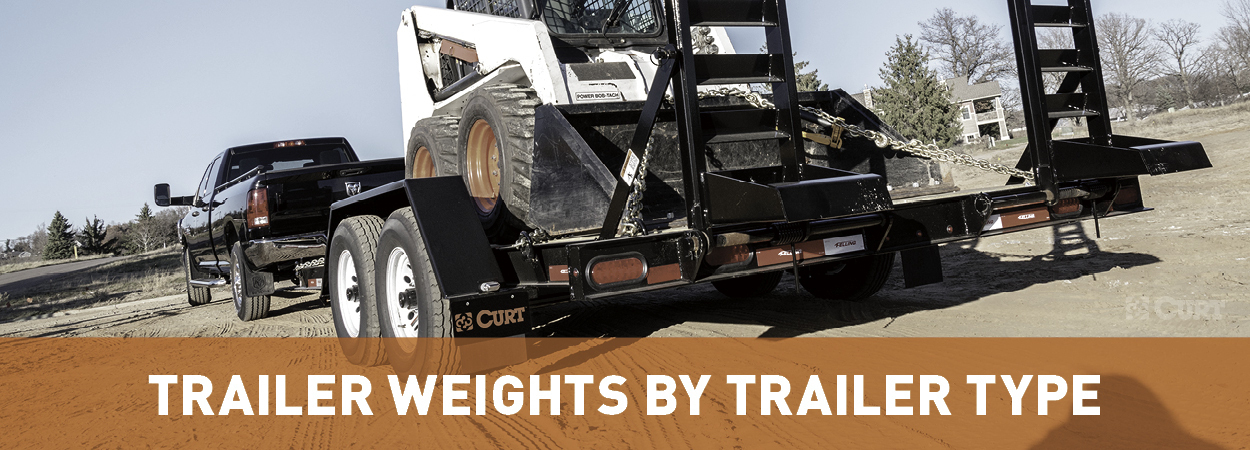

How Much Does a Trailer Weigh?
Each type of trailer has a specific purpose, and because of this, the weight of each trailer is different. Trailers also vary greatly in their capacities, lengths and construction.
This trailer weight chart and guide provides the average weight of each type of trailer, as well as the weight range, the gross vehicle weight rating (GVWR) and the average load capacity.
Warning! The trailer weights listed below are intended to be a general guideline only. The actual weight and ratings of your specific trailer will vary.
Trailer Weight Chart
Tap each trailer type to read more
| Trailer Type | Average Empty Weight (lbs.) | Empty Weight Range (lbs.) | GVWR (lbs.) | Average Load Capacity (lbs.) | |
| |
Canoe / Kayak Trailer | 200 | 100 to 400 | 200 to 800 | 200 |
| |
Jet Ski Trailer | 300 | 100 to 500 | 800 to 3,000 | 1,500 |
| |
Motorcycle Trailer | 500 | 300 to 800 | 1,300 to 3,500 | 1,900 |
| |
Fishing Boat Trailer | 600 | 200 to 1,100 | 900 to 6,000 | 2,700 |
| |
Tow Dolly | 600 | 400 to 800 | 3,000 to 5,000 | 3,400 |
| |
Small Open Utility Trailer | 700 | 300 to 1,100 | 1,000 to 3,000 | 1,800 |
| |
Small Enclosed Utility Trailer | 1,000 | 400 to 1,800 | 2,000 to 7,000 | 2,200 |
| |
Teardrop Trailer | 1,700 | 500 to 3,200 | 2,000 to 4,000 | 700 |
| |
A-Frame Camper | 1,700 | 1,200 to 2,300 | 2,500 to 3,600 | 1,200 |
| |
Car Trailer | 1,900 | 1,500 to 2,800 | 6,000 to 15,000 | 7,100 |
| |
Large Boat Trailer | 2,200 | 1,100 to 4,400 | 5,400 to 34,400 | 11,400 |
| |
Pop Up Camper | 2,300 | 1,400 to 3,000 | 2,700 to 4,000 | 1,100 |
| |
Large Enclosed Utility Trailer | 2,700 | 900 to 5,200 | 3,000 to 10,000 | 4,400 |
| |
Small Travel Trailer | 2,800 | 1,200 to 3,900 | 1,900 to 4,500 | 800 |
| |
Small Horse Trailer | 2,900 | 2,300 to 3,900 | 7,000 to 8,000 | 4,300 |
| |
Large Flatbed Trailer | 3,000 | 500 to 7,700 | 2,900 to 26,000 | 7,400 |
| |
Dump Trailer | 4,500 | 1,100 to 10,100 | 3,000 to 30,000 | 12,400 |
| |
Large Travel Trailer | 6,700 | 4,500 to 8,700 | 6,300 to 10,500 | 1,600 |
| |
Gooseneck Flatbed Trailer | 7,200 | 4,700 to 10,400 | 15,900 to 36,000 | 16,000 |
| |
Large Livestock Trailer | 7,300 | 4,200 to 10,900 | 14,000 to 24,000 | 11,400 |
| |
Toy Hauler | 7,600 | 3,600 to 11,400 | 14,700 to 22,500 | 10,300 |
| |
5th Wheel Camper | 12,700 | 5,000 to 16,000 | 17,000 to 20,000 | 6,000 |
| *Each individual trailer must be weighed on its own. Never exceed the lowest-rated towing component, including the vehicle, hitch and trailer. | |||||
Brief explanation of terms
- Empty Weight – The weight of the trailer without any cargo or fluids; also called Dry Weight or Unloaded Weight
- GVWR – The maximum weight a trailer is rated to weigh, including cargo, fluids, etc.
- Load Capacity – The total weight of the cargo a trailer is rated to carry
For further explanation of these terms, visit our Towing Capacity Guide.
Weigh Your Trailer with Your Phone!
The CURT BetterWeigh™ is a small Bluetooth device that allows you to weigh your trailer and vehicle, using your smartphone. It simply plugs into the OBD-II port on your vehicle, syncs with your phone and displays real-time vehicle and trailer weights on the free downloadable app.
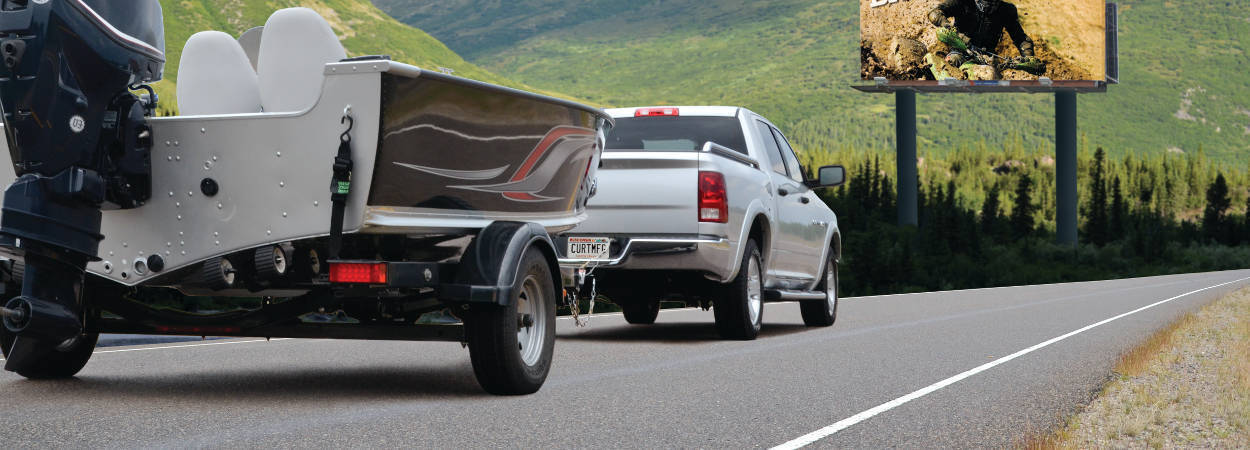

Camper Weight Chart
There are several different types of campers, from small teardrop trailers to deluxe 5th wheel RVs. This chart provides a focused look at average weights and capacities for most camper types.
| Camper Type | Average Empty Weight (lbs.) | Empty Weight Range (lbs.) | GVWR (lbs.) | Average Load Capacity (lbs.) | |
| |
Teardrop Camper | 1,700 | 500 to 3,200 | 2,000 to 4,000 | 700 |
| |
A-Frame Camper | 1,700 | 1,200 to 2,300 | 2,500 to 3,600 | 1,200 |
| |
Pop Up Camper | 2,300 | 1,400 to 3,000 | 2,700 to 4,000 | 1,100 |
| |
Small Travel Trailer | 2,800 | 1,200 to 3,900 | 1,900 to 4,500 | 800 |
| |
Large Travel Trailer | 6,700 | 4,500 to 8,700 | 6,300 to 10,500 | 1,600 |
| |
Toy Hauler | 7,600 | 3,600 to 11,400 | 14,700 to 22,500 | 10,300 |
| |
5th Wheel Camper | 12,700 | 5,000 to 16,000 | 17,000 to 20,000 | 6,000 |
| *Each individual trailer must be weighed on its own. Never exceed the lowest-rated towing component, including the vehicle, hitch and trailer. | |||||
Weigh your trailer with your smartphone! Check out BetterWeigh™


Trailer Weights Explained


Canoe / Kayak Trailer Weight
Canoe and kayak trailers are small trailers used for hauling personal watercraft such as canoes, kayaks and even paddleboards.
They typically weigh between 100 and 400 pounds when unloaded. The average weight of a canoe or kayak trailer is 200 pounds.
Depending on the number of watercraft the trailer is designed to carry -- one, two, four or more – the maximum trailer weight can be anywhere from 200 to 800 pounds.
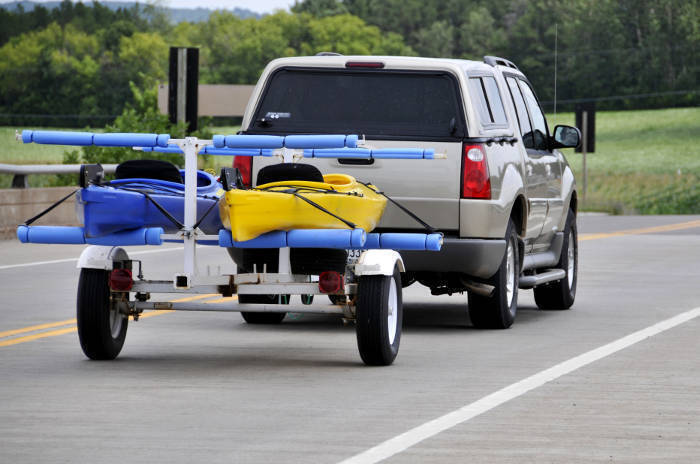



Jet Ski Trailer Weight
Similar to a small boat trailer, jet ski trailers have an average empty weight of 300 pounds. Smaller jet ski trailers weigh as little as 100 pounds and larger ones are closer to 500 pounds.
When loaded, the weight of a jet ski trailer can fluctuate from 800 to 3,000 pounds with an average load capacity of 1,500 pounds.
Weight ratings will differ based on the number of jet skis the trailer is configured to haul.
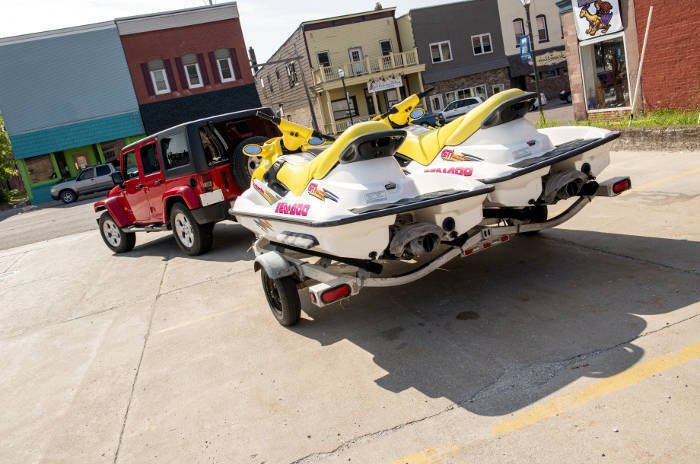



Motorcycle Trailer Weight
A motorcycle trailer is designed for transporting a motorcycle, allowing it to be towed by another vehicle. This is different from a trailer towed by a motorcycle, also known as a motorcycle trailer.
Unloaded, a motorcycle trailer may weigh 300 to 800 pounds with an average weight of 500 pounds. They are commonly rated for a maximum trailer weight of 1,300 to 3,500 pounds, making their average load capacity just under 2,000 pounds.
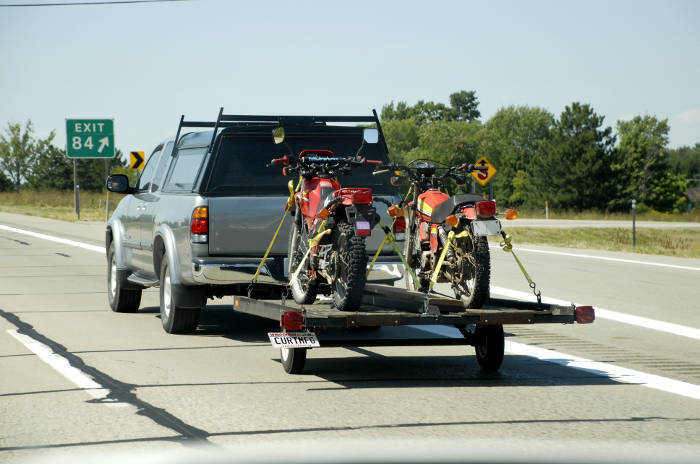



Fishing Boat Trailer Weight
A fishing boat trailer usually weighs 200 to 1,100 pounds on its own, without a boat loaded. The average for a boat trailer is about 600 pounds.
Combined boat and trailer weight ratings ranges from 900 to 6,000 pounds, depending on the length of the trailer and the boat itself.
The average weight capacity for a fishing boat trailer is about 2,700 pounds.
Weigh your boat trailer with your phone! Discover the BetterWeigh™
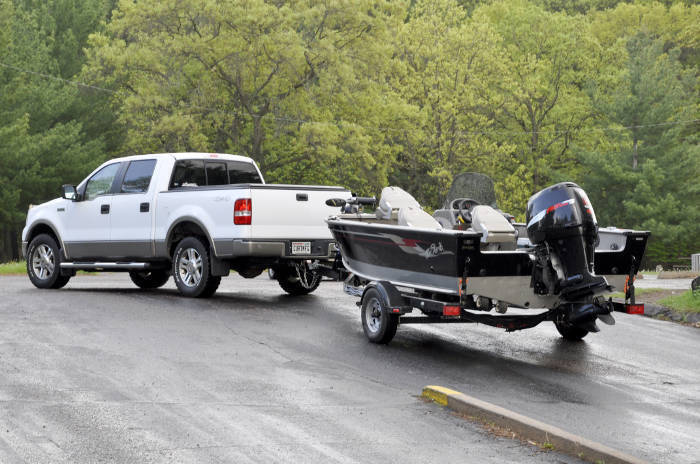



Tow Dolly Weight
A tow dolly for dinghy towing a vehicle usually weighs about 600 pounds without a vehicle hooked up. Some tow dollies weigh as a little as 400 pounds and others as much as 800 pounds, depending on the style and construction.
Tow dolly weight capacity ranges from 3,000 to 5,000 pounds. The capacity refers specifically to the total weight of the dinghy vehicle. However, the average capacity for most tow dollies is closer to 3,400 pounds.




Small Open Utility Trailer Weight
Utility trailers typically weigh about 700 pounds unloaded, but they can vary greatly – from 300 to 1,100 pounds – depending on the construction, width, features, number of axles and more. The type of trailer referred to here is an open utility trailer less than 10 feet long.
The weight capacity of a small utility trailer can also range significantly. A short, aluminum utility trailer may only have a GVWR of 1,000 pounds, while a wide, double-axle, steel utility trailer may be rated for 3,000 pounds.
The average cargo load for small utility trailers is 1,800 pounds.
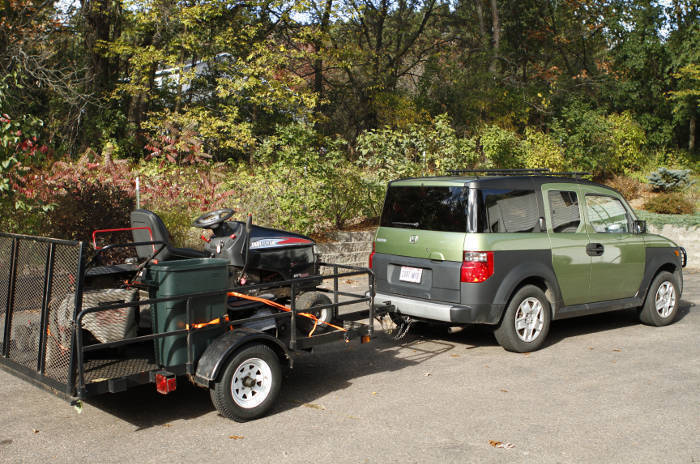



Small Enclosed Trailer Weight
Empty weight for small enclosed trailers spans from 400 to 1,800 pounds. The average for this type of trailer is 1,000 pounds, but this is determined largely by the materials used to construct the trailer and the number of axles.
When fully loaded, a small enclosed utility trailer can be rated for a maximum of up to 7,000 pounds (GVWR). However, for trailers 12 feet long or less, the average cargo load capacity is typically around 2,200 pounds.
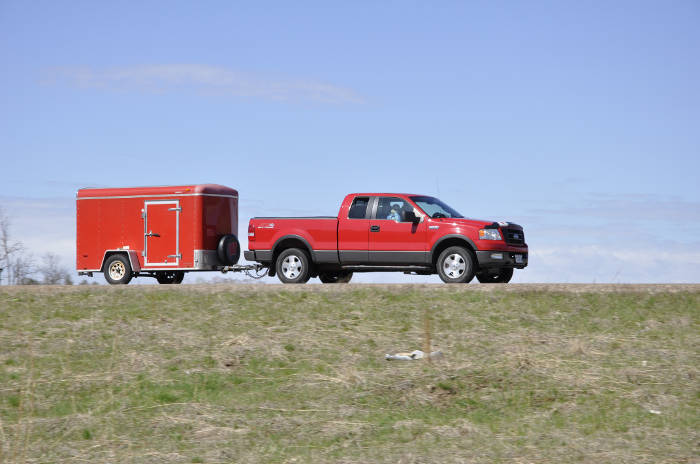



Teardrop Trailer Weight
Teardrop camper trailers weigh between 500 and 3,200 pounds, but the average is about 1,700 pounds. It all depends on the features included. Some teardrop trailers have a fully integrated kitchen and awning system. Others are more basic.
Maximum teardrop camper weight can be as much as 4,000 pounds (GVWR). Some are only rated for 2,000 pounds.
Most teardrop campers aren’t designed to tow a lot of weight, and the average cargo capacity is only about 700 pounds.
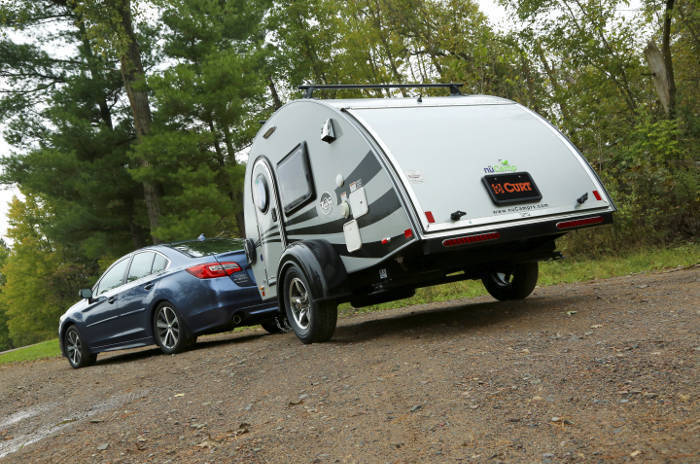



A-Frame Camper Weight
An A-frame camper is a specific type of pop up camper trailer. This type of camper usually weighs between 1,200 and 2,300 pounds unloaded. The average weight is 1,700 pounds.
A-frame campers provide a substantial amount of cargo capacity with an overall average of 1,200 pounds. Gross vehicle weight ratings for this type of trailer range from 2,500 up to 3,600 pounds.
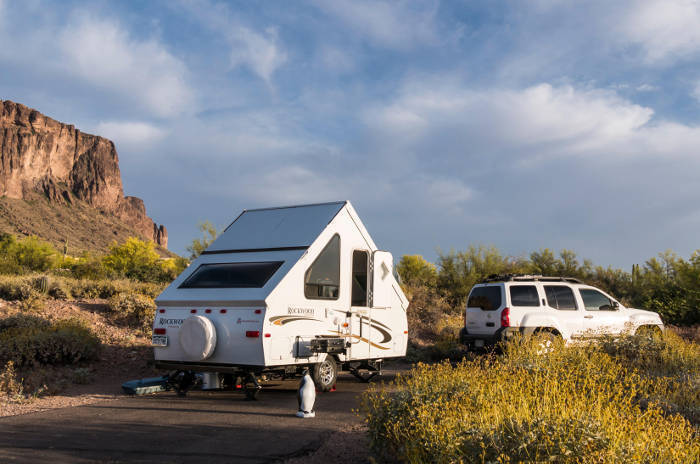



Car Trailer Weight
A car trailer can weigh anywhere from 1,500 to 2,800 pounds by itself. The average is 1,900 pounds. With one or more cars loaded, that weight increases to as much as 15,000 pounds.
The weight of a car trailer largely depends on its construction, length and style. A bumper pull car hauler with length enough for one car may have a GVWR of 6,000 pounds, while a double-car gooseneck trailer could max out at 15,000 pounds. Additionally, aluminum car trailer weight and capacity will vary greatly from steel.
On average, the load capacity for car trailers is 7,100 pounds.
Weigh your car trailer with your phone! Discover the BetterWeigh™




Large Boat Trailer Weight
Larger boat trailers are used for hauling yachts, pontoon boats and other heavy watercraft. For this type of trailer, the empty weight ranges from 1,100 to 4,400 pounds, and the average is about 2,200 pounds.
When loaded with a large boat, the trailer weight increases greatly. The capacity depends on the build of the trailer and its configuration. GVWR can be as low as 5,400 pounds or as high as 34,400 pounds.
Average load capacity for large boat trailers is around 11,400 pounds.
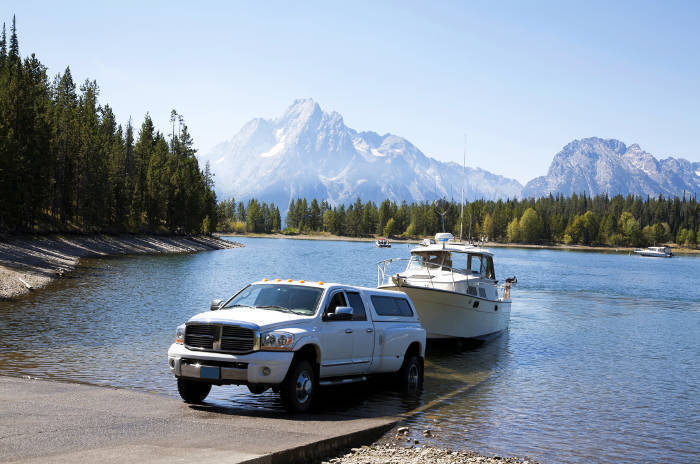



Pop Up Camper Weight
The average weight of a pop up camper is about 2,300 pounds unloaded. Some are as little as 1,400, and others weigh as much as 3,000 pounds if they are equipped with certain features.
When fully loaded (GVWR), pop up trailer weight can range from 2,700 up to 4,000 pounds, giving this type of camper an average load capacity of 1,100 pounds. This provides plenty of room for a propane tank, water tank, grille, bedding, luggage and other necessary cargo for a successful campout.
Weigh your pop up camper with your phone! Discover the BetterWeigh™
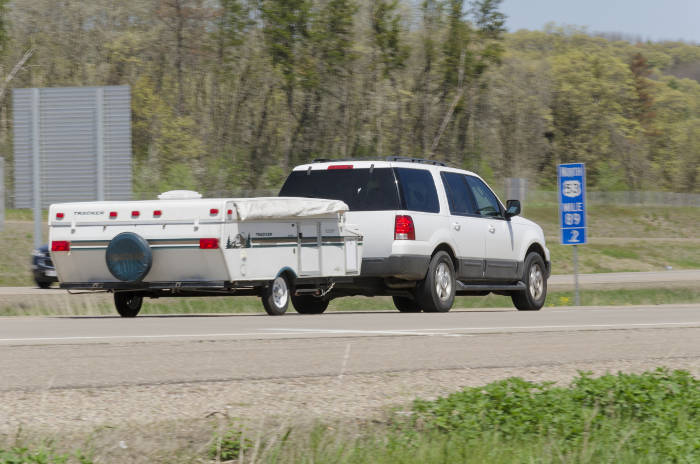



Large Enclosed Trailer Weight
Large enclosed trailers, namely those 12 feet or longer with a bumper pull coupler, typically weigh about 2,700 pounds when empty. Some are little as 900 pounds. Heavy-duty models weigh up to 5,200 pounds.
The capacity of a large enclosed utility trailer can vary based on how many axles it has, the construction of the frame and other factors.
In general, the average cargo capacity is 4,400 pounds. However, some 12-foot enclosed trailers only have a gross vehicle weight rating of 3,000 pounds. Longer units are rated as high as 10,000 pounds.
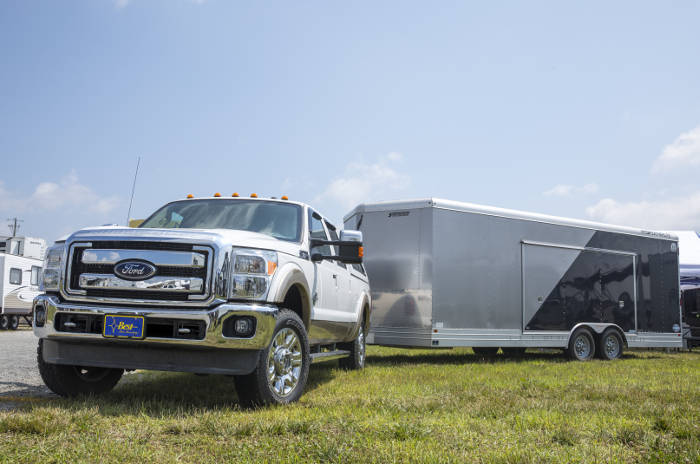



Small Travel Trailer Weight
A smaller travel trailer – about 22 feet long or less – has an average weight of about 2,800 pounds. The unloaded weight range is typically between 1,200 and 3,900 pounds.
The gross vehicle weight rating of small travel trailers varies from 1,900 pounds up to 4,500 pounds.
Generally, small travel trailers don’t have a lot of extra cargo capacity. The average is only about 800 pounds. However, some are rated to carry as much as 1,400 pounds. The cargo capacity may increase with certain design features and additional axles.
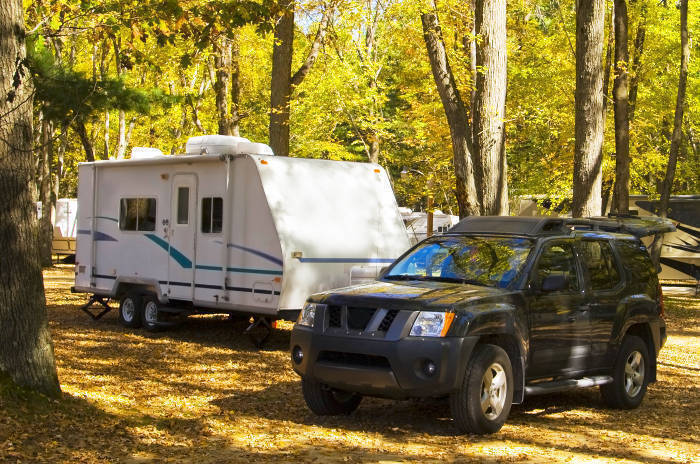



Small Horse Trailer Weight
A horse trailer designed to transport one or two horses typically weighs between 2,300 and 3,900 pounds. With horses and cargo loaded, this number increases. The average empty weight of a horse trailer is about 2,900 pounds.
When loaded up, small horse trailers max out at 7,000 or 8,000 pounds (GVWR). This allows for a cargo capacity of about 4,300 pounds.
Load capacities vary by trailer style and construction. A simple, one-horse trailer made from aluminum will weigh far less than a deluxe, two-horse trailer with a steel frame.
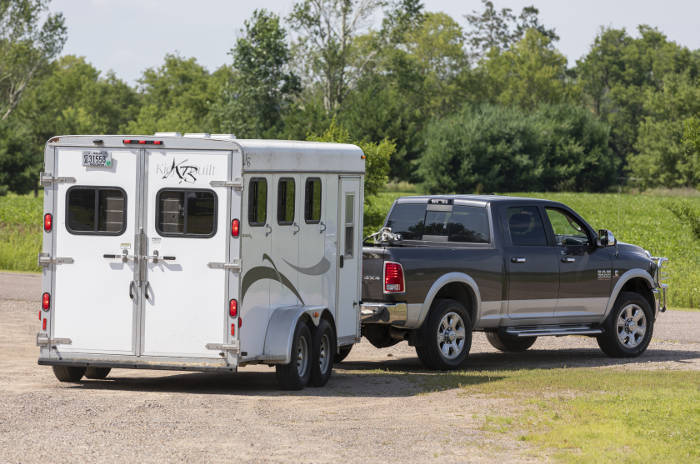



Large Flatbed Trailer Weight
Large flatbed trailers, such as car haulers, equipment trailers and utility flatbeds, can weigh anywhere from 500 to 7,700 pounds, even when empty.
However, because they are designed for transporting large amounts of cargo, most large flatbed trailers – that is, bumper pull flatbed trailers – have a higher cargo capacity. The average is about 7,400 pounds.
For gross trailer weight ratings on flatbed trailers, the low end is around 2,900, but some are rated as high as 26,000 pounds, even with a bumper pull configuration. Gooseneck models are rated even higher.
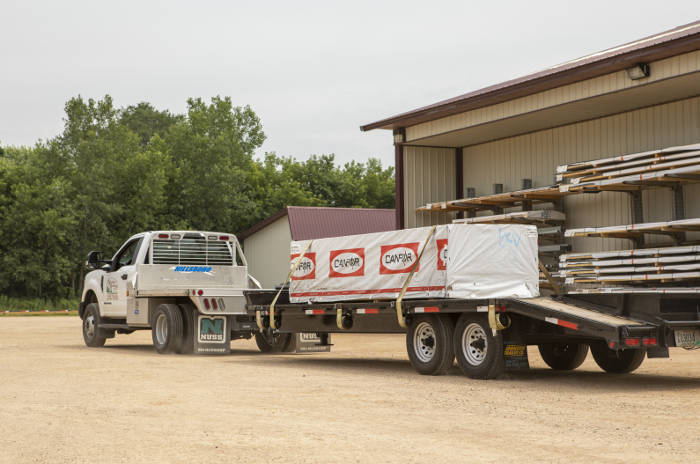



Dump Trailer Weight
When empty, a dump trailer can weigh anywhere from 1,100 to just over 10,000 pounds. The average weight for dump trailers is 4,500 pounds unloaded.
This type of trailer is extremely useful for transporting large amounts of fine or loose materials – everything from gravel to demolition waste. The hydraulic or powered dump receptacle makes unloading fast and easy.
The smallest dump trailers have a gross vehicle weight rating of 3,000 pounds. The largest models can weigh as much as 30,000 pounds. The average GVWR for dump trailers is around 12,400 pounds.




Large Travel Trailer Weight
A large travel trailer – anything around 20 feet or longer – has an average weight of about 6,700 pounds. Specifically, this refers to the travel trailer dry weight. This weight is largely dependent on the types of features and how many axles the trailer has.
Some larger travel trailers only weigh about 4,500 pounds, but the largest are around 9,000 pounds. 5th wheel camper trailers weigh even more.
When fully loaded with cargo, supplies and fluids, the gross vehicle weight rating of a travel trailer can vary from 6,300 to 10,500 pounds. The average cargo capacity of a bumper pull travel trailer is 1,600 pounds.
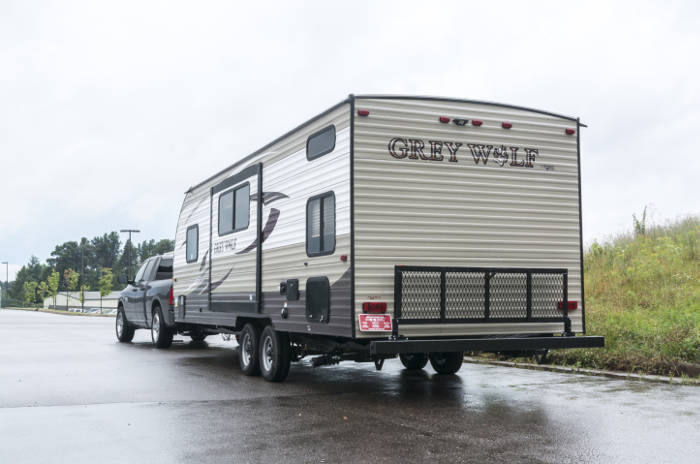



Gooseneck Flatbed Trailer Weight
Gooseneck flatbed trailers and utility trailers generally have higher weight ratings than their bumper pull cousins. A typical gooseneck flatbed trailer weighs about 7,000 pounds without cargo.
Smaller gooseneck flatbeds can weigh as little as 4,700 pounds, but the largest are upwards of 10,000 pounds.
For gross vehicle weight ratings, gooseneck flatbed trailers are built for heavy-duty hauling, whether it’s construction materials, farm equipment or automotive toys. Some are only rated for a maximum weight just under 16,000 pounds. Heavier-duty options are rated up to 36,000 pounds.
The average load capacity for gooseneck flatbed trailers is 16,000 pounds.
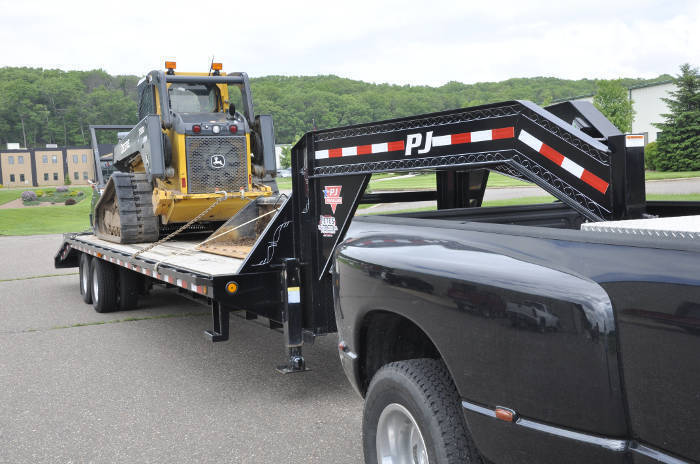



Large Livestock Trailer Weight
Larger livestock trailers range in weight from 4,200 to nearly 11,000 pounds when unloaded. With animals and cargo on board, that range increases up to 24,000 pounds (GVWR).
Livestock trailers are fairly diverse in their design and size. For example, a 20-foot aluminum bumper pull livestock trailer will be much lighter than a 40-foot steel gooseneck horse trailer. Some livestock trailers are also equipped with wash stalls, a living space and other features, adding to the overall weight.
The average empty weight for large livestock trailers is about 7,300 pounds. For load capacity, the average is around 11,400 pounds.
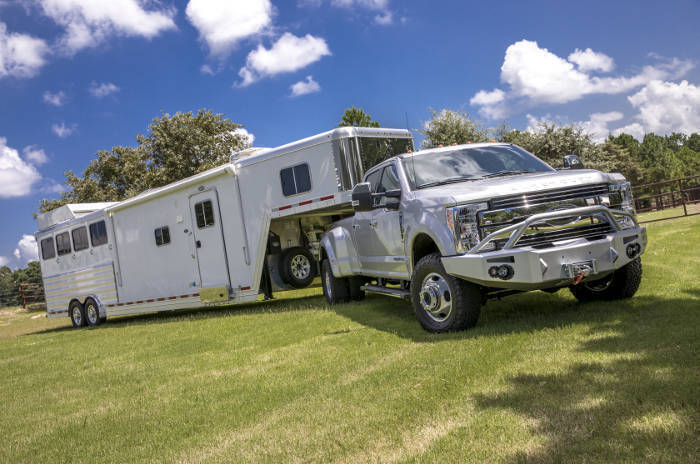



Toy Hauler Weight
A toy hauler is a bumper pull, 5th wheel or gooseneck trailer with a living space and a large compartment for transporting ATVs, UTVs, dirt bikes and other recreational motorsport vehicles.
Toy haulers, when unloaded, range in weight from 3,600 to 11,400 pounds, with an average of about 7,600 pounds.
Because they’re built for transporting smaller vehicles, toy haulers generally have a higher cargo capacity. The average is about 10,000 pounds.
Gross vehicle weight ratings for toy hauler trailer can vary from just under 15,000 to over 22,000 pounds.
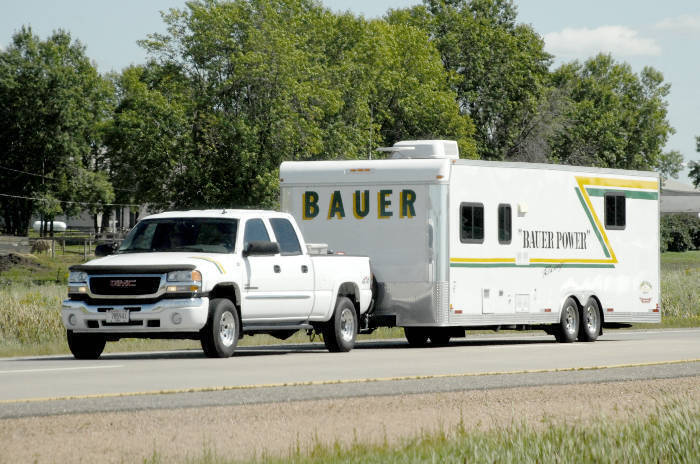



5th Wheel Camper Weight
5th wheel campers have an average weight of 12,700 pounds, empty and unloaded. Smaller models weigh as little as 5,000 pounds, while the largest 5th wheel camper trailers weigh up to 16,000 pounds.
To allow plenty of space for camping gear, equipment, cargo and fluids, the average load capacity is 6,000 pounds.
When fully loaded and ready for towing, most 5th wheel campers have a gross vehicle weight rating between 17,000 and 20,000 pounds.
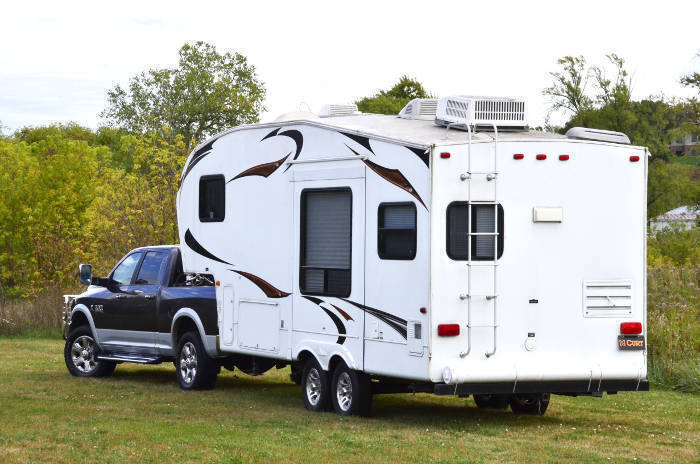

Weigh any trailer with your smartphone! Check out BetterWeigh™
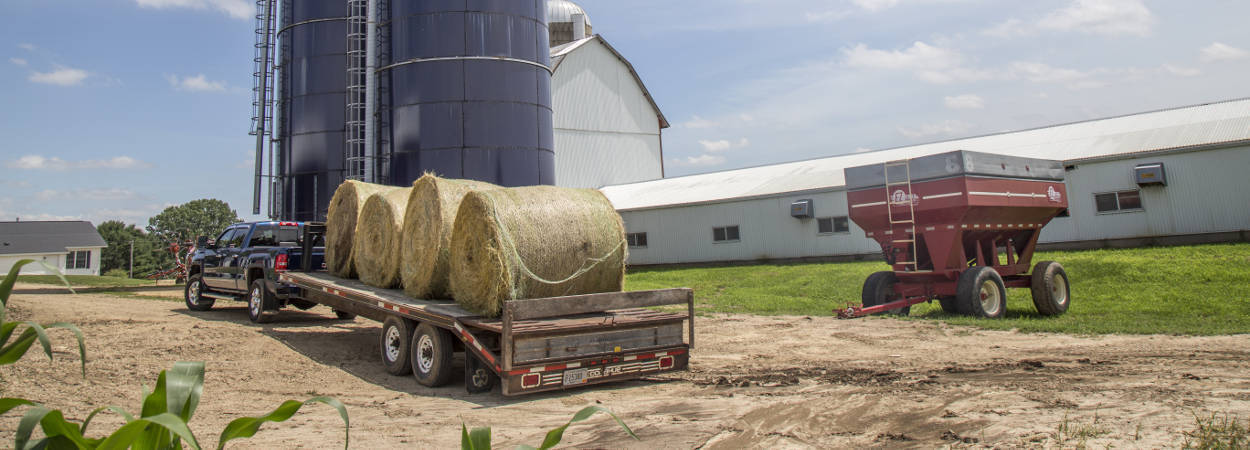

FAQs
1. How much does a camper weigh?
A camper can weigh anywhere from 500 to 20,000 pounds. It all depends on the style of the camper. For example, a teardrop camper usually weighs about 1,500 pounds unloaded, while a 36-foot 5th wheel camper can weigh as much as 15,000 pounds, even when empty.
2. How much does a teardrop trailer weigh?
A teardrop trailer is one of the smallest camper types and one of the lightest. They typically weigh between 500 and 3,000 pounds, but the average is closer to 1,500. Some teardrop camper trailers have a gross vehicle weight rating as high as 4,000 pounds.
3. How much do pop up campers weigh?
Pop up campers weigh between 1,400 and 4,000 pounds. When empty and unloaded the average weight for pop up campers is about 2,300 pounds. However, they can also carry an average cargo load of 1,100 pounds. For maximum vehicle weight, a pop up camper can range from 2,700 to 4,000 pounds (GVWR).
4. How much does a small camper weigh?
A small camper can weigh anywhere from 500 pounds to 4,500 pounds, depending on the style. Teardrop campers, pop up campers and shorter travel trailers can all be classified as small campers. The average weight of a teardrop camper is about 2,000 pounds with cargo, and the average for small travel trailers is about 3,000 pounds.
5. How much does a travel trailer weigh?
Travel trailers vary in weight from 1,200 to almost 9,000 pounds. They come in various lengths, styles and builds, allowing for a diverse weight range. Smaller travel trailers have an average maximum weight of about 3,500 pounds (GVWR). Some larger travel trailers can max out at over 10,000 pounds when fully loaded up.
6. How much does a 5th wheel weigh?
5th wheel trailers are one of the heaviest types of trailer, with an average empty weight of about 13,000 pounds. The average gross vehicle weight rating for 5th wheel trailers is around 18,000 pounds, but some are as much as 20,000. Additionally, gooseneck trailers with a 5th wheel conversion can be even heavier.
7. How much does a boat trailer weigh?
Boat trailers by themselves can weigh as little as 100 pounds or as much as 4,400 pounds. The weight is determined by the length of the trailer and the type of boat or boats it is designed to carry. For example, jet ski trailers are about 300 pounds on average. Standard fishing boat trailers usually don’t weigh more than 1,000 pounds. Large yacht trailers, even without a boat loaded on, can easily be over 4,000 pounds.
8. How much does a boat and trailer weigh?
A boat and trailer together can weigh anywhere between 900 and 35,000 pounds. For small fishing boats and jon boats, the total weight for the boat and trailer ranges from 900 to 6,000 pounds. On the other hand, a heavy-duty yacht trailer and its craft together can easily weigh beyond 30,000 pounds.
9. How much does a horse trailer weigh?
Horse trailers vary in length, construction and features. A basic, aluminum single-horse trailer usually weighs less than 3,000 pounds. On the other hand, 12-horse trailers or horse trailers with a living space, elaborate wash stalls and other equipment can weigh upwards of 20,000 pounds.
10. How much does a 2-horse trailer weigh?
2-horse trailers weigh between 2,000 and 8,000 pounds. Some are more simple and constructed from lightweight materials. Others are more elaborate and longer, even though the horse capacity remains at 2 maximum. The average load capacity for a 2-horse trailer is about 4,000 pounds.
11. How much does an enclosed trailer weigh?
The weight of an enclosed trailer can fluctuate from 400 pounds to more than 20,000 pounds, depending on the style of the trailer and whether it is loaded with cargo or not. For example, a small, basic, enclosed utility trailer, empty of all cargo, may only weigh 500 pounds. Conversely, a toy hauler loaded up with a few ATVs might weigh in at 22,000 pounds.
12. How much does a car trailer weigh?
An unloaded car trailer usually weighs between 1,500 and 3,000 pounds. Gooseneck-style car trailers can weigh over 10,000 pounds. The construction, length and number cars the trailer is built to transport can make a huge difference. When loaded, the weight of some car trailers can increase to as much as 36,000 pounds.
Warning! The trailer weights listed on this page are intended to be a general guideline only. The actual weight and ratings of your specific trailer will vary.
 ARIES
ARIES  CURT
CURT  LUVERNE
LUVERNE  UWS
UWS 



